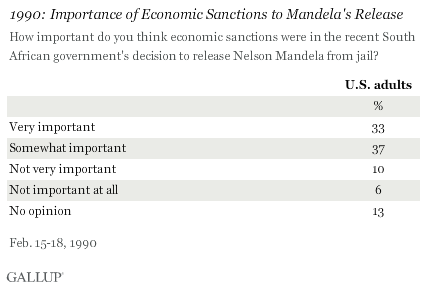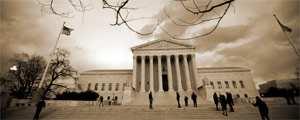Roughly a quarter of a century ago, on Feb. 11, 1990, the South African government released civil rights leader Nelson Mandela from prison after he served 27 years on charges of treason and sabotage against the national government. In a subsequent Gallup poll, most Americans said economic sanctions against South Africa had played a very (33%) or somewhat (37%) important role in the civil rights leader's release.

The same poll found 62% of Americans believing the U.S. should maintain sanctions against South Africa to keep up the pressure on that country to dismantle apartheid. However, that was a significant change from 1985, the year before the sanctions went into effect, when Americans were split on the issue: 42% in favor and 39% opposed.
Although some argue that geopolitical and domestic forces, not sanctions, were the primary reasons Mandela was freed, Mandela himself has credited sanctions, and perhaps as a result, his case is one of the more prominent economic sanctions "success stories." In 2016, economic sanctions are a familiar aspect of U.S. foreign policy, playing a key role in bringing Iran to the negotiating table and providing a major tool in efforts to rein in North Korea. Just this week, the United Nations piled on more sanctions against North Korea in response to that country's ongoing nuclear tests.
These data can be found in Gallup Analytics.
Read more from the Gallup Vault.



